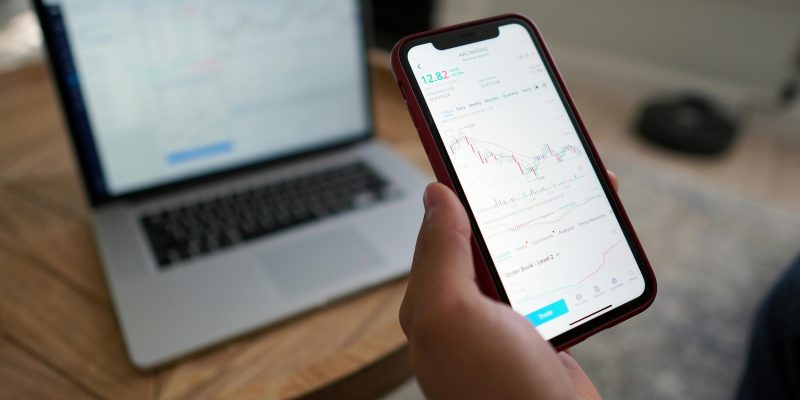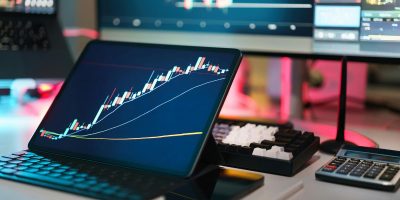The financial industry has been revolutionized with the concept of online trading, as it has made it easier for individuals to invest in assets from anywhere in the world. It is especially the rise of user-friendly trading apps that has made online trading more accessible and understandable to people, making more and more people involved in the financial market. This is happening through stocks, forex, and cryptocurrencies.
An introduction to online trading
The term online trading refers to buying and selling financial instruments such as stocks, bonds, commodities, and currencies through internet-based platforms. Where traditional trading requires brokers and involves complex procedures, online trading has simplified the trading process with easy-to-use interfaces and instant execution of trades.
Some of the most popular financial instruments being traded online include stocks, which involves buying shares of companies to profit from price appreciation or dividends. Forex (foreign exchange) trading is also quite popular, where currencies are being traded to take advantage of fluctuations in exchange rates. Commodities, such as gold, oil, and agricultural products are also being traded online. The latest addition to popular financial instruments being traded online is cryptocurrencies such as Bitcoin and Ethereum, which are digital currencies being traded on online platforms.
The rise of trading apps
The surge in mobile trading apps has democratized access to financial markets. A recent report by Future Market Insights found that the global stock trading app market was estimated at a worth of USD16266.1 million in 2023, and the value is projected to reach a value of USD1,10,624.4 million by 2033. What is driving this increase in value is accessibility, changed consumer behavior preferencing a mobile-first lifestyle, and the user-friendliness of these platforms. These characteristics are also what makes these app attractive to seasoned investors and beginners.
What trading apps provides users are access to a range of financial instruments, which makes it possible for users to trade on their smartphones. With features such as real-time data, advanced charting tools, and easy order execution, these apps are a great tool for casual investors and active traders.
The best way to get started with online trading
If you want to get started with online trading, there are some fundamentals you should know about first before you dive in. The first and most important step is to find a reliable broker or trading app. Selecting the right platform is crucial for smooth trading experiences, which will make your experience much more enjoyable. You should look for brokers with a strong reputation, low fees, and reliable customer service. Additionally, you should understand the costs. Many trading apps promote commission-free trading, but there can be potential hidden costs such as spreads, withdrawal fees, and inactivity charges. This is why comparing different platforms is crucial, to understand the total costs of transactions and services.
A good strategy to apply from the beginning is to start small and practice. Various apps also offer demo accounts so you can practice trading with virtual money, before you start risking real capital. In this way you can learn about market dynamics and test your strategies. Another good strategy is to familiarize yourself with different asset classes and trading strategies. Understanding concepts such as market trends, technical analysis, and risk management can improve your trading skills.
Advantages of online trading and trading apps
The main advantage of engaging in online trading through trading apps is the convenience for investors. Since you can trade anytime and anywhere from your smartphone or computer, you have flexibility on the global markets that are open 24/7. Trading apps often have lower costs than traditional brokers, which makes it more affordable to a broader range of people to engage in trading.
Using trading apps also means you get full control over your trades and investments, which consequently means increased transparency and control. With real-time data, these platforms can help you in making informed decisions. Many trading apps also offer educational tools which can help new traders learn the ropes. Through tutorials, market updates, and webinars, these apps have a lot of material for anyone who wants to get started with online trading.
Challenges and risks
As with any other activity in life, there is always a downside to online trading and trading apps. The biggest challenge is market volatility due to the unpredictability of financial markets. Furthermore, if you choose to trade volatile assets such as cryptocurrencies or forex pairs, you can risk losing your investments. Traders are especially at risk of being impacted by market downturns in being unprepared for such risks.
One risk related to trading aps is the risk of emotional trading. Since trading apps are easily accessible, impulsive decisions driven by emotions can end up being applied instead of rational analysis. This is why it is always recommended to have a well-planned strategy and follow it.
Trends shaping the future of online trading
Due to certain trends, the future of online trading is looking even more attractive to a broader audience. One trend is social trading, where users can follow and replicate the trades of experienced investors. In this way, beginners can learn from strategies of more seasoned traders, which fosters a community-driven trading environment.
Furthermore, trading platforms are incorporating gamification, i.e. gaming elements such as leaderboards and rewards, which makes the platforms and trading more engaging to users. This will enhance user experience and motivate people to manage their portfolios, furthering the accessibility of online trading.
Feature Photo: supplied
DISCLAIMER: This article is sponsored and does not substitute for professional advice or help. Any action you take based on the information presented in this article is strictly at your own risk and responsibility.






Each level in Stickman Hook introduces new layouts, faster momentum, and harder obstacles. One wrong swing and your stickman will fall — back to the start you go!